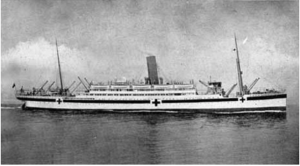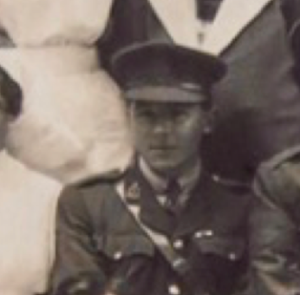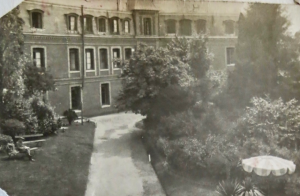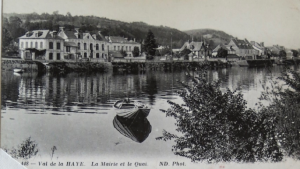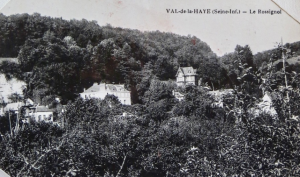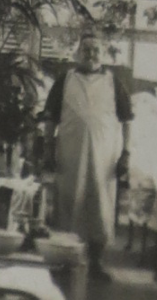Monthly Archives: May 2018
3rd May to 4th May 1918 Friday and Saturday
Blighty bound!
All material produced or reproduced here and throughout this work is the sole copyright of the author and the family of Doctor D.C.M. Page MC.
“About 1am on Friday, May 3rd, I left hospital at Rouen, by ambulance car for Blighty, feeling wonderfully happy in spite of the early hour of departure. We were motored to the Docks Station where we boarded No. 9 ambulance train. There were six of us in a compartment – myself (a Scot), an American doctor, a Lancashire lad, an Irishman, a Yorkshire lad and an officer from the Naval Division. I slept most of the night. We got to Havre at 7 o’clock, and had breakfast and lunch on the train. At 2 p.m. we went aboard the hospital ship ‘Essiquibo’ – a fine boat, only 3 years old, with seven water-tight compartments. I got a lovely little cabin all to myself, and was most comfortable. After an excellent dinner in the gorgeous saloon, we had lifeboat drill, and then a sing-song which delighted the ship’s officers. I slept peacefully all night, and woke up to find our good ship berthed in Southampton. We were disembarked at 10 o’clock and transferred to an ambulance train, which was soon speeding on its way across beautiful England to Oxford. On arrival there we were driven in private cars to our hospital in Somerville College – a beautiful spot. So ended my adventures in France and Flanders.”
HMHS Essequibo was built in 1915 and had been leased to Canada that used her to repatriate men home to Canada. During such a run near the coast of Ireland she was intercepted by a German U-boat that fired a couple of warning shots to stop her. The Germans having ascertained that she was indeed a hospital ship, Essequibo was allowed to continue her journey. She survived the war and was sold to the Pacific Steam Navigation Company in 1922.
After the two day journey and motor transfer to the hospital at Somerville College, Douglas became a patient at the hospital where he spent some time recuperating, before transferring to the War Hospital in Chester. At the moment we have no dates for these events but will add them when we find out.
Douglas ended the first volume of his diary here and makes no mention of his time in Chester but did have a photograph that we include here.
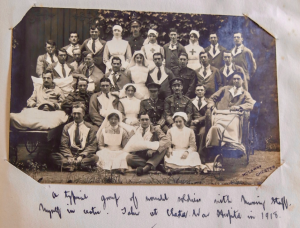
A typical group of wounded soldiers with nursing staff, myself in centre. Taken at Chester War Hospital in 1918.
The first volume of the War Diary of Doctor Douglas C. M. Page M.C. ends here, but there will be some intermediate entries and additions between now and August and the beginning of Volume 2. Hopefully we will have more information on what happened between arriving in Oxford and finding himself aboard yet another ship, bound this time not for the Western Front, but Northern Russia and Archangel. Please join us on that ship in the Autumn to discover the incredible adventures of a remarkable man as his war continues.
At this point it is pertinent to remember another remarkable man. Douglas’s son Gordon Page who sent a copy of this diary to his niece Elizabeth Coggin and so to share Douglas’s adventure with us and now with the world. Gordon passed away very recently and will be sorely missed by his family and friends. He is survived by his wife Ruth, sons Brian and Matthew and daughter Belinda. Brian has also provided us with decent copies of the pictures in the diary for which I am very grateful.
It is a great pleasure to dedicate this work to Gordon Page.
Find out about our connection with Dr Page and an introduction to his diary here
17th April to 2nd May 1918 Wednesday to Thursday
The Road to Recovery
All material produced or reproduced here and throughout this work is the sole copyright of the author and the family of Doctor D.C.M. Page MC.
“I was in bed for ten days, and the condition of my throat gradually got better. I was extremely well cared for. When I did get up I was very shaky, but was glad to get out into the beautiful gardens of the hospital (a theological college in peace time). When I was able I got out into the town, and saw the lovely cathedral, and the shops. In the mornings I used to help Major Austin in the wards by giving chloroform whilst he dressed the seriously wounded officers.
One afternoon another officer and I went for a trip up the river on one of the small steam-boats. It was a beautifully warm and sunny day, and we enjoyed our outing very much. We got off the boat at a pretty little place called Val de Haye, and after a stroll through the village had tea at a place run by an Englishman. There was a merry party of nurses and V.A.D.s on board, and we sang all the way back to Rouen.
Another day we journeyed up river to La Bouille, also a very pretty little village, where we had coffee and biscuits in a quaint old inn.”
By now we know Douglas Page to be a master of the understatement. His narrow escapes that can only pay allegiance to Lady Luck seemed to be never more than a nasty nuisance, responsible for the occasional “wind up”! However, although not deserting him entirely, luck had now worn a bit thin and for the time being at least removed him from the front line of war. The contrast must have been tremendous. Often never more than a few feet or a split second away from being blown to kingdom come, this painful time in hospital at least gave some time to enjoy the nicer side of France.
La Bouille, a little further downstream today retains its rural charm and a convenient car ferry to cross the river.
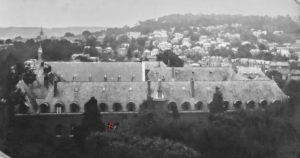
The No.2 British Red Cross Hospital, Rouen, France. The red cross denotes the ward where Captain Page was a patient.
If Douglas were able to take that same trip now one hundred years later he would be totally shocked at the transformation of the idyllic scene he enjoyed then. Today both banks of the river are lined with the infrastructure of heavy industry. Many wharves flanked by gas and oil tanks, silos, and factories, railway tracks with marshalling yards mark France’s modern prosperity.
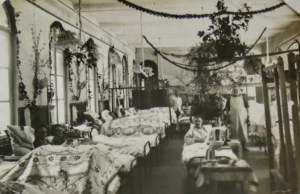
A ward in the No.2 British Red Cross Hospital, Rouen, a former theological college. Major Austin (the surgeon) standing in the centre of the ward.
Find out about our connection with Dr Page and an introduction to his diary here
